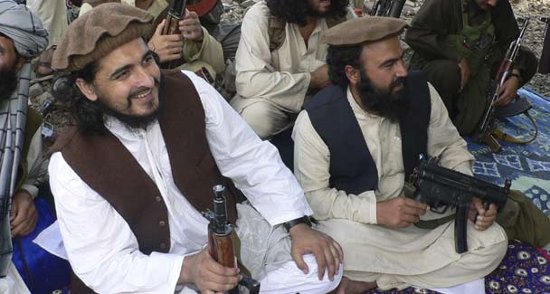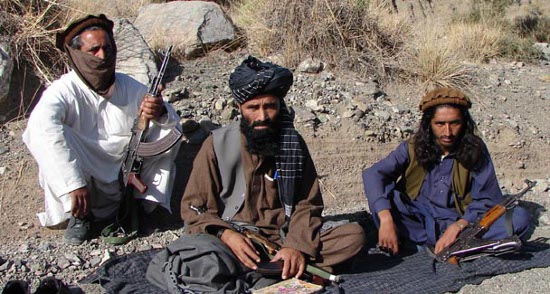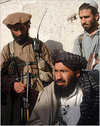|
|
|
Hakeemullah and Waliur Rehman Mehsud, before the Pakistani Army launched the South Waziristan offensive. |
Six local Taliban groups based in the western half of South Waziristan have joined the Movement of the Taliban in Pakistan, the spokesman for the terror group said. He also claimed that the top two leaders of the Pakistani Taliban are alive, despite reports of their deaths in US Predator strikes in early October.
The six local Taliban groups are based in and around Wana, the main town of South Waziristan. The Wana region is under the control of Taliban commander Mullah Mohammad Nazir, who is both an ally and a rival of Hakeemullah Mehsud, the leader of the Movement of the Taliban in Pakistan.
The merger of the six Wana-based groups with the Movement of the Taliban in Pakistan was announced yesterday by Azam Tariq, Hakeemullah’s spokesman, in an interview with Flashpoint Global Partners.
|
|
|
Azam Tariq (center). |
“Six groups of the Wanna have joined TTP [Tehrik-i-Taliban Pakistan or the Movement of the Taliban in Pakistan] and expressed their confidence in the leadership of Hakeemullah Mehsud,” Tariq said.
Tariq identified the commanders of the six groups as Maulvi Muhammad Iftikhar, Maulvi Abbas, the Mujahid Wali Muhammad, Commander Javed Khan, Commander Din Muhammad, and Mir Afghan. Tariq also outlined the top-level command structure of the Wana group.
“Wali Muhammad has been appointed by Hakeemullah Mehsud as head of the TTP in Wana, Commander Javed will serve as the deputy commander and Maulvi Muhammad Suleman has been assigned the duties of spokesperson for Wana,” Tariq said.
Mujahid Wali Muhammad was identified as the son of famed Taliban commander Nek Mohammed, who was killed in the first recorded US Predator strike in Pakistan in 2004. Muhammad replaced Haji Omar, another Taliban commander who was killed in a Predator strike earlier this year.
The announcement that the six local Taliban groups have joined the Movement of the Taliban in Pakistan coincides with an uptick in attacks in South Waziristan, including in the Wana area. Over the past several months, the Taliban have carried out a suicide attack at a mosque in Wana and killed eight Pakistani soldiers in the Mehsud areas.
Nazir, who has sheltered Waliur Rehman Mehsud’s forces as well as al Qaeda and other terror groups, is not part of the Movement of the Taliban in Pakistan. Nazir has clashed with the Mehsuds in the past due to tribal differences as well as the presence of Uzbek fighters based in his tribal areas.
|
|
|
Mullah Nazir. |
But Nazir has openly stated that he supports Osama bin Laden and Mullah Omar. The Pakistani establishment considers Nazir one of the so-called “good Taliban” as he does not advocate attacks against the Pakistani state, and the government cut a peace deal with Nazir rather than battle his forces. During an operation that began in October 2009, the Pakistani military moved only against the Movement of the Taliban in Pakistan based in the Mehsud tribal areas in the eastern half of South Waziristan.
Jihad in Afghanistan and Pakistan
In his recent interview, Tariq said that the Taliban groups in Wana are “carrying out activities in various parts of Afghanistan and are actively involved in jihad.” He also maintained that the Movement of the Taliban in Pakistan will continue to wage jihad against the state of Pakistan and that Predator strikes will not stop them and in fact help their cause.
“Jihad against the Government of Pakistan is very much there and it will continue until a single uniformed soldier is present in this area,” Tariq stated. “It is true that drone attacks have increased in North Waziristan but these attacks do not undermine our resolve. Rather they enhance it as it proves the genuineness of our jihad and reveals the infidelity of the Pakistani government that allows its air bases to be used for these drone attacks. So these drone attacks have helped shore up public support for us and strengthen our resolve.”
While acknowledging that the Taliban’s jihad in Afghanistan is important, Tariq said the Movement of the Taliban in Pakistan is focusing on fighting the Pakistani state.
“We have extremely close relations with Afghanistan and these are exemplary,” Tariq said. “The philosophy of jihad does not believe in geographic demarcation but our concentration is more towards Pakistan because, according to Shariah as well as Pashtunwali [tribal code], our prime responsibility is to end the prevailing cruel system in this country and to replace it with Islamic laws.”
Hakeemullah and Qari Hussain are alive
Tariq also stated that Hakeemullah and Qari Hussain Mehsud, the Taliban’s master trainer of suicide bombers, have survived US Predator strikes in Pakistan, despite reports of their deaths. But Tariq’s statement that Qari Hussain “is eating too” indicates he may have been wounded in a Predator strike.
“Praise be to Allah, he (Qari Hussain) is alive,” Tariq said. “He is alive. He is eating too .”
Tariq said that Pakistani officials are claiming the two Taliban commanders are dead in order to keep the US aid money flowing. The US has targeted Hakeemullah and Qari Hussain for their roles in sponsoring Faisal Shahzad’s failed car bomb attack on May 1, 2010 at Times Square in New York City.
“[News of his death] is false propaganda, as was the case with the reporting about Hakeemullah’s death,” Tariq said. “This is how they [the Pakistani government] want to consume the [funds from the] Kerry-Lugar bill. Because of the Republicans clinching the majority in the majority in the Congress, the aid to Pakistan seems to be in the doldrums.”
On multiple occasions since the spring of 2008, the Pakistani and US governments, and numerous media outlets, have reported that Hakeemullah and Qari Hussain have been killed. Earlier this year, US and Pakistani officials insisted that Hakeemullah was killed in strikes in January and February, but this was disproved when he appeared on a videotape with Faisal Shahzad that was released immediately after the failed Times Square bombing in early May.











9 Comments
the talibs dont know the word surrender…actually they never heard of it…even if someone explained it they would still not understand what its about…
lets call it a day shall we?
That’s interesting, because the Wana region of South Waziristan is dominated by Wazirs while the TPP leadership seems to be dominated by Mehsuds. Is there reliable intelligence on the composition of TTP and what role tribal affiliation plays in the TPP?
South Waziristan is only the gates to hell.
North Waziristan is hell, and until the Pakistani Army launches a full offensive without holding back, the rest of the world will continue to suffer while Muslim Pakistan sits on their hands and does nothing about this massive problem.
@crusader: Call it day?
Nah, I don’t think we will just yet.
Nope. there wil be no “calling it a day”. Fury will be uneashed against the destructive elements until no one wants to fill the power vacuum.
You can’t reason with them. Might as well eradicate them.
Then, when it nice and quiet up there in Northern Pakistan, people might be able to start traveling there to enjoy the natural beauty without fear.
Is it just me or does anyone else find it odd that the Good Talibs are stationed adjacent to the Pakistani Air Force Base in the area?
Looks like a drug runner’s dream.
I think the world leaders should work on one point agenda “abolish all lawless areas “at any cost by hook or by crook. This would be the only solution for world peace and prosperity.
Wahid,
I like it. I really like it!
Its exactly this spirit that is missing. Especially so at a political level.
Still something akin to this is inevitable. After all, how long can this situation continue? And what other constructive options are there, even with all the goodness in the world? Sometimes things have to die off before they can be alive again.
I’ll be lining up to enjoy that natural beauty that no doubt abounds there.
Spot on Blert!
No drugrunning through pak turf without major profit.
No running without heavy backshish to top brass.